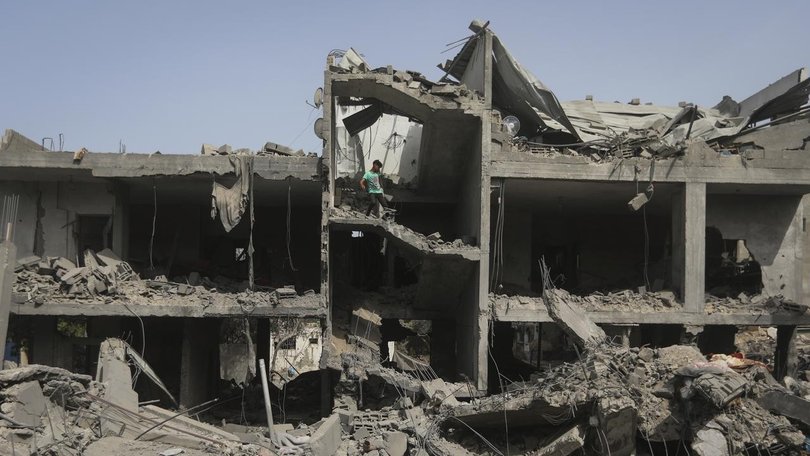Israeli air strike on Nuseirat kills 27 as fighting rages on in Gaza

An Israeli air strike has killed 27 people in central Gaza, mostly women and children, as fighting with Hamas raged across the north and Israel’s leaders aired divisions over who should govern Gaza after the war.
Prime Minister Benjamin Netanyahu faces criticism from the other members of his War Cabinet, with main political rival Benny Gantz threatening to leave the government if a plan is not created by June 8 that includes an international administration for postwar Gaza.
US National Security Adviser Jake Sullivan met with Netanyahu to discuss an ambitious US plan for Saudi Arabia to recognise Israel and help the Palestinian Authority govern Gaza in exchange for a path to eventual statehood.
Sign up to The Nightly's newsletters.
Get the first look at the digital newspaper, curated daily stories and breaking headlines delivered to your inbox.
By continuing you agree to our Terms and Privacy Policy.Netanyahu’s office in a statement said they focused on Israel’s military operation in the southern Gaza city of Rafah, humanitarian aid and hostages held in Gaza.
Netanyahu opposes Palestinian statehood, saying Israel will maintain open-ended security control over Gaza and partner with local Palestinians unaffiliated with Hamas or the Western-backed Palestinian Authority.
The US said Sullivan said Israel should “connect its military operations to a political strategy” and proposed measures to ensure more aid “surges” into Gaza.
The air strike in Nuseirat, a built-up Palestinian refugee camp in central Gaza dating back to the 1948 Arab-Israeli war, killed 27 people, including 10 women and seven children, according to records at Al-Aqsa Martyrs Hospital in nearby Deir al-Balah, which received the bodies.
A separate strike on a Nuseirat street killed five people, according to the Palestinian Red Crescent emergency service. In Deir al-Balah, a strike killed Zahed al-Houli, a senior officer in the Hamas-run police, and another man, according to the hospital.
Palestinians reported more air strikes and heavy fighting in northern Gaza, which has been largely isolated by Israeli troops for months and where the World Food Program says a famine is underway.
The Civil Defence said strikes hit several homes near Kamal Adwan Hospital in Beit Lahiya, killing at least 10 people.
Mahmoud Bassal, a spokesman for the Civil Defence, said rescuers had recovered at least 150 bodies, more than half of them women and children, since Israel launched the operation in Jabaliya last week.
Israel launched its offensive after Hamas’ October 7 attack in which militants stormed into southern Israel, killing around 1200 people, mostly civilians, and abducting about 250. Mourners gathered on Sunday for the funeral of one of four hostages killed in the attack whose bodies were recently found by Israeli troops in Gaza.
The war has killed at least 35,000 Palestinians, according to Gaza’s Health Ministry, which doesn’t distinguish between combatants and civilians. Around 80 per cent of the population of 2.3 million Palestinians have been displaced within the territory, often multiple times.
“We need a decent life to live,” said Reem Al-Bayed, who left Gaza City and shelters with thousands in the gritty coastal Muwasi camp in the south without basic facilities like wells. “All countries live a decent life except us.”
Netanyahu’s critics, including thousands of Israeli protesters, accuse him of prolonging the war and rejecting a cease-fire deal so he can avoid a reckoning over security failures. They also seek early elections in which polls show that Gantz, a political centrist, would likely succeed Netanyahu. That would expose Netanyahu to prosecution on longstanding corruption allegations.
Netanyahu denies any political motives and says the offensive must continue until Hamas is dismantled and the estimated 100 hostages still held with the remains of more than 30 others are returned.
Netanyahu also faces pressure from Israel’s closest ally, the United States, which has provided military aid and diplomatic cover for the offensive while expressing growing frustration with Israel’s conduct of the war and the humanitarian crisis.
President Joe Biden’s administration recently held up a shipment of 3500 bombs and said the US would not provide offensive weapons for a full-scale invasion of Rafah, citing fears of a humanitarian catastrophe.
The Palestinian Crossings Authority in a statement said humanitarian aid has not entered through the vital Rafah border crossing with Egypt since the military operation began almost two weeks ago.
